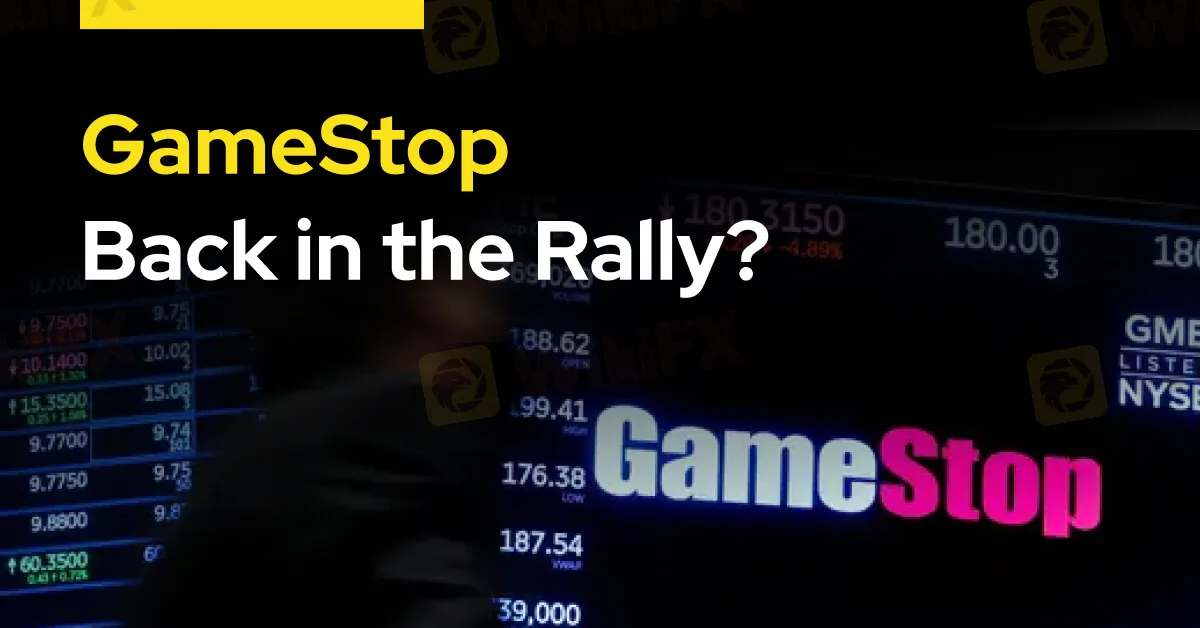简体中文
繁體中文
English
Pусский
日本語
ภาษาไทย
Tiếng Việt
Bahasa Indonesia
Español
हिन्दी
Filippiiniläinen
Français
Deutsch
Português
Türkçe
한국어
العربية
GameStop Back in the Rally?
Abstract:GameStop's stock (GME) experienced a substantial increase of nearly 60% on Tuesday, continuing a meme-fuelled rally that had already boosted the video game retailer's shares by 74% in the previous session. Is GameStop back in the game or is this a dead-cat bounce?

GameStop's stock (GME) experienced a substantial increase of nearly 60% on Tuesday, continuing a meme-fuelled rally that had already boosted the video game retailer's shares by 74% in the previous session.

Similarly, AMC (AMC) stock saw a significant rise, climbing about 30% after having surged as much as 120% earlier on Tuesday. In an SEC filing, AMC disclosed that it issued around 72.5 million new shares in the prior session, raising approximately $250 million for the company.
Other heavily shorted stocks also joined the rally on Tuesday, with SunPower (SPWR) increasing by 63%, Beyond Meat (BYND) rising 25%, and the Children's Place (PLCE) gaining about 6%.
GameStop's shares had surged as much as 110% in the previous session, spurred by the reappearance of Keith Gill, also known as “Roaring Kitty.” Gill's bullish outlook on GameStop had originally sparked the meme stock rally back in 2021.
Before Monday's rally, GameStop's stock had been flat for the year but had increased by approximately 60% over the past month. With Tuesday's gains included, GameStop's stock has risen over 180% in the last month.
Nicholas Colas, co-founder of DataTrek Research, commented in a client note that the recent trading action “feels like an echo of early 2021,” when a short squeeze dramatically inflated GameStop's stock. Colas recalled that the 2021 surge saw GameStop's stock soar 1,500% in January before losing most of those gains.
Despite the significant losses short sellers endured during the original meme stock rally three years ago, bets against these companies have persisted. Data from S3 Partners showed that short interest in GameStop has remained high, with nearly 24% of the float shorted.
GameStop shorts lost $1.36 billion on Tuesday, following a $900 million loss on Monday. Ihor Dusaniwsky, managing director of S3 Partners, stated that the market is seeing continued squeeze-related short covering due to the revival of the meme trade.
Colas believes that for traders shorting a stock experiencing such aggressive rallies, there is only one viable option: to close out the position regardless of the price. He added that in the case of GameStop, there is a fear that retail traders will be enticed into a replay of 2021.
The meme frenzy three years ago garnered national attention, drawing a large number of retail traders during the pandemic lockdowns. Tom Sosnoff, CEO of tastylive, an options and futures trading platform, expressed that he views the current situation differently from 2021, when it was almost a transformational moment, bringing tens of millions of people back into the marketplace.
Nevertheless, YouTuber Matt Kohrs, who has previously held positions in GameStop and AMC, believes that the dynamic of “the little guy versus the big guy” seen during the short squeezes of 2021 remains relevant in the current rally. Kohrs noted that the perception is that the entire system is set up and insulated to benefit the powerful elite, and GameStop is the symbol of the populist movement against that concept. He observed that the primary psychological shift now is that people are no longer confined to their homes.

Disclaimer:
The views in this article only represent the author's personal views, and do not constitute investment advice on this platform. This platform does not guarantee the accuracy, completeness and timeliness of the information in the article, and will not be liable for any loss caused by the use of or reliance on the information in the article.
Read more

Anti-Scam Groups Urge Tougher Action on Fraudsters in UK
Anti-scam groups demand tougher police action on fraudsters as UK fraud rates surge 19%, targeting millions in a penalty-free crime spree exposed by a $35m scam leak.

Will natural disasters have an impact on the forex market?
The forex market is known for its rapid responses to global events, but the influence of natural disasters, such as earthquakes and typhoons, can be less straightforward. While headlines may scream about catastrophic damage and economic disruption, the long-term effects on currency values often depend on a blend of immediate shock and underlying economic fundamentals.

Philippines Deports 29 Indonesians Linked to Online Scam Syndicate in Manila
Online scam groups in the Philippines trick Filipinos into gambling and love scams, from Manila to Bacolod, causing trafficking and pain as police fight back.

Why does your mood hinder you from getting the maximum return from an investment?
Investment decisions are rarely made in a vacuum. Aside from the objective data and market trends, our emotions—and our overall mood—play a crucial role in shaping our financial outcomes. Whether you’re feeling overconfident after a win or anxious after a loss, these emotional states can skew your decision-making process, ultimately affecting your investment returns.
WikiFX Broker
Latest News
How Crypto Trading Transforms FX and CFD Brokerage Industry
UK would not hesitate to retaliate against US tariffs - No 10 sources
FCA Warns Against 10 Unlicensed or Clone Firms
CySEC Warns Against 14 Unlicensed Investment Websites
Top Currency Pairs to Watch for Profit This Week - March 31, 2025
Will natural disasters have an impact on the forex market?
Philippines Deports 29 Indonesians Linked to Online Scam Syndicate in Manila
Navigating the Intersection of Forex Markets, AI Technology, and Fintech
Exposed: Deceptive World of Fake Trading Gurus – Don’t Get Fooled!
AI-Powered Strategies to Improve Profits in Forex Trading
Currency Calculator







